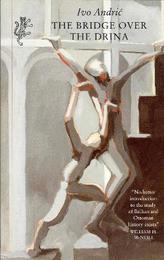
|
The Bridge Over the Drina
Paperback / softback
Main Details
| Title |
The Bridge Over the Drina
|
| Authors and Contributors |
By (author) Ivo Andric
|
| Physical Properties |
| Format:Paperback / softback | | Pages:320 | | Dimensions(mm): Height 216,Width 135 |
|
| Category/Genre | Modern and contemporary fiction (post c 1945)
Historical fiction |
|---|
| ISBN/Barcode |
9781860460586
|
| Classifications | Dewey:891.8235 |
|---|
| Audience | |
|---|
|
Publishing Details |
| Publisher |
Vintage Publishing
|
| Imprint |
The Harvill Press
|
| Publication Date |
5 April 1994 |
| Publication Country |
United Kingdom
|
Description
A vivid depiction of the suffering history has imposed upon the people of Bosnia from the late 16th century to the beginning of World War I, The Bridge Over the Drina won Andric the Nobel Prize for Literature In the small Bosnian town of Visegrad the stone bridge of the novel's title, built in the sixteenth century on the instruction of a grand vezir, bears witness to three centuries of conflict. Visegrad has long been a bone of contention between the Ottoman and Austro-Hungarian Empires, but the bridge survives unscathed until 1914, when the collision of forces in the Balkans triggers the outbreak of World War I. The bridge spans generations, nationalities and creeds, silent testament to the lives played out on it. Radisav, a workman, tries to hinder its construction and is impaled alive on its highest point; beautiful Fata leaps from its parapet to escape an arranged marriage; Milan, inveterate gamble, risks all in one last game on it. With humour and compassion, Andric chronicles the lives of Catholics, Muslims and Orthodox Christians unable to reconcile their disparate loyalties.
Author Biography
Ivo Andric was born in 1982 in Travnik, Bosnia of Croat parents and grew up alongside Orthodox Christians, Muslims and Roman Catholics in Visegrad, the town on the banks of the Drina in which the book is set. Until 1941 he served a Yugoslav diplomat, then, placed under house arrest in Belgrade by the occupying Germans, Andric turned to writing. In 1961 he was awarded the Nobel prize for literature. he died in 1975.
ReviewsIn high school, one Saturday, I started reading a book by the Yugoslav novelist Ivo Andric: The Bridge on the Drina. By the time I finished it something in me had shifted forever * New Statesman * Despite its scale, what makes the book extraordinary is the tender insight with which it treats these individual lives, whether Catholic, Orthodox, Muslim or Jewish * Independent * Perhaps the most widely translated Yugoslav book since the last war is Ivo Andric's The Bridge on the Drina... No better example could have been selected with which to introduce the American public to contemporary Yugoslav prose * New York Times * The best kind of fictionalised history * Daily Telegraph * The wealth and variety of its fictional elements carry it so far beyond the confines of a straightforward novel, it cannot be limited to such a description. It puts one in mind of a collection of tales, but no collection of tales (not even A Thousand and One Nights or Washington Irving's stories) ever possessed such a unity and continuity of theme * Le Monde *
|